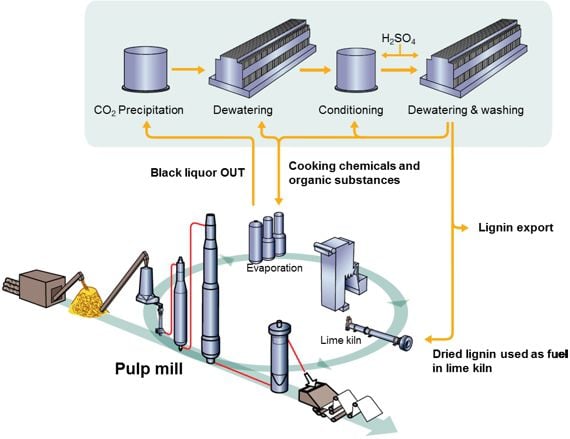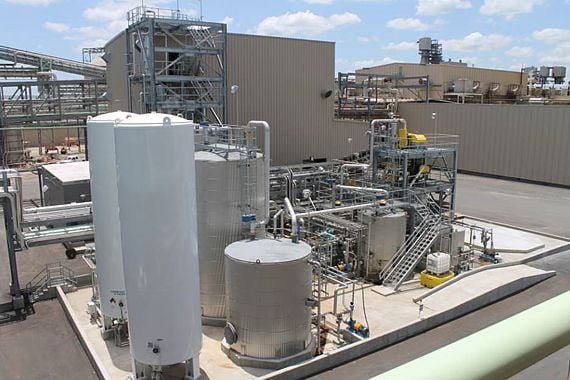LignoBoost plants produce large volumes of lignin, case studies
LignoBoost™ is a complete system, exclusively available from Valmet, which extracts lignin from Kraft black liquor (Figure 1). When a recovery boiler is the limiting factor to increasing pulping capacity, LignoBoost is a good solution to the problem. If 25% of the lignin in the black liquor is removed, boiler capacity can be increased to enable 20-25% more pulp production. In addition, lignin is an outstanding biofuel with high heating value and can be used onsite to decrease consumption of fossil fuel. Finally, lignin can be sold to use for the manufacture of specialty chemicals or as fuel in pellet or powder form.

Figure 1 LignoBoost extracts lignin from Kraft black liquor
The first two commercial LignoBoost installations are at the Domtar - Plymouth plant in North America, and more recently the Stora Enso - Sunila plant in Finland.
Plymouth LignoBoost Plant
The first full-scale LignoBoost plant was started up in 2013 at Domtar’s Plymouth, North Carolina mill, where high-quality lignin is a by-product of the kraft pulping process (Figure 2). This mill has an annual capacity of 466,000 ADMT of softwood kraft pulp and the main raw material is Southern Pine. A lignin plant capacity of 25,000 MT per year allowed the mill to de-bottleneck the recovery boiler and sell the incremental pulp. Lignin was originally intended to be burned in a power boiler, with the potential to sell.

Figure 2 The LignoBoost plant at Domtar Plymouth
Lignin removal provided immediate benefit to the host mill and created a platform and (indirect) funding source for longer term, development projects and products.
During the early stages of the Plymouth plant start up a lot of time was spent tuning controlling parameters on process parts to get them to work optimally. All in all it took about 17 days before the first washed lignin cake was produced on February 15th 2013. Domtar now markets the lignin as BioChoice™ lignin.
Sunila LignoBoost plant
A second LignoBoost plant started up in 2015 at Stora Enso’s Sunila mill in Finland. Sunila produces 370,000 ADMT of bleached softwood Kraft pulp from pine and spruce and the annual capacity of the lignin plant is 50,000 MT. The aim of this installation was not to de-bottleneck the recovery boiler or to increase pulp production but to be the first step toward a new business line by selling pure high quality lignin to external customers.
The first lignin cake was produced December 7, 2014, one and a half weeks after black liquor was fed to the process for the first time. The overall project duration was 18 months.
This installation in Sunila also included storage for moist lignin, a dryer, lignin dust burners in the lime kilns and a packaging line. Moist lignin that has a dry solids content of about 65% is dried in a ring dryer utilizing off-gases from the lime kilns as drying media. During drying lignin particles break down into a fine powder with dry solids content above 95%. Dried lignin is thereafter pneumatically conveyed using nitrogen to the lime kilns and/or the packaging plant.
Safety has been a main concern in the project considering both management of gases formed during lignin precipitation and the dust explosions risks connected to handling of the fine, dry lignin powder.
Conclusions
With the start-up of lignin production sites at Domtar’s Plymouth NC mill in the USA and Stora Enso’s Sunila mill in Finland the existing kraft lignin market has grown significantly. Lignin extraction is a door opener in transforming the pulp and paper industry toward the biorefinery concept. Refined lignin can be used for producing bioplastics, adhesives and chemicals such as phenol or BTX or replacing fossil based fuel. Other interesting areas where it could be utilized are in carbon fiber production (low cost carbon fiber) and as precursor to “green carbon” products such as reinforcement filler or activated carbon.
Valmet’s innovative LignoBoost bioenergy technology works as expected, taking a low value stream that was burned in a recovery boiler and converting it into potential value-added revenue streams by separating the lignin from the black liquor. The first and second LignoBoost™ plants are commercial, and several other projects are being developed. Experiences from the start-ups have and will be successfully transferred to the next project. This has shortened the start-up time and increased the knowledge in how to operate the plant efficiently and ramp up the capacity.
The positive results of the first LignoBoost installations would not have been possible without excellent work by the staff at both mills, the project teams, technology teams and process teams.
A detailed explanation of the LignoBoost process and the lessons learned at both installations may be found in a technical paper entitled "Important lessons learned during the commercialization of the LignoBoost process." which was presented at the TAPPI 2015 International Bioenergy and Bioproducts Conference. Contact TAPPI (www.tappi.org) or your Valmet representative for a copy of this paper.
For more information on increasing pulping capacity or generating new revenue streams with lignin removal, contact your Valmet representative.